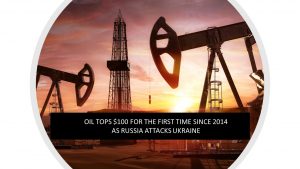Oil tops $100 for first time since 2014 as Russia attacks Ukraine

Oil prices surged on Thursday, with Brent breaching $100 a barrel for the first time since 2014, after Russia attacked Ukraine, exacerbating concerns that a war in Europe could disrupt global energy supplies.
After Russian President Vladimir Putin authorized what he called a special military operation, Ukraine’s Foreign Minister Dmytro Kuleba said in a tweet that Russia had launched a full-scale invasion of Ukraine and was targeting cities with weapons strikes.
Russia is the world’s second-largest oil producer, mainly selling its crude to European refineries, and is the largest provider of natural gas to Europe, providing about 35% of its supply.
Brent crude rose to as much as $103.78 a barrel, the highest since Aug. 14, 2014, and was at $103.18 a barrel at 0830 GMT, up $6.34, or 6.5%.
U.S. West Texas Intermediate (WTI) crude futures jumped $5.48, or 6%, to $97.58 a barrel, after rising to as much as $98.46, the highest since Aug. 11, 2014.
Oil prices have surged more than $20 a barrel since the start of 2022 on fears that the United States and Europe would impose sanctions on Russia’s energy sector, disrupting supplies.
Underscoring the supply concerns, the premium of front-month Brent to the second-month future rose by as much as 75 cents to $3.54 a barrel, the most since 2011.
“This growing uncertainty during a time when the oil market is already tight does leave it vulnerable, and so prices are likely to remain volatile and elevated,” said Warren Patterson, head of ING’s commodity research.
While there are no sanctions yet on the energy trade, western nations and Japan on Tuesday punished Russia with new sanctions for ordering troops into separatist regions of eastern Ukraine and threatened to go further if Moscow launched an invasion of its neighbor.
“It’s not just geopolitical risk that is the problem but the further straining of supply,” OCBC economist Howie Lee said.
“Russian oil supply will disappear overnight if faced with sanctions… and OPEC can’t produce fast enough to cover this gaping hole.”
Some members of the Organization of the Petroleum Exporting Countries (OPEC) said this week there is no need for the group and its allies to increase output further as a potential deal between Iran and world powers over the oil producers’ nuclear programme would increase supplies.
The U.S. and Iran have been engaged in indirect nuclear talks in Vienna that could lead to the removal of sanctions on Iranian oil sales.
However, certain OPEC members are already struggling to meet current output targets. [OPEC/O]
Japan and Australia said on Thursday they were prepared to tap their oil reserves, together with other International Energy Agency member countries, if global supplies were reduced by the hostilities in Ukraine.
“While Western governments probably will exempt energy transactions from sanctions, the blizzard of new restrictions will force many traders to be exceedingly cautious in handling Russian barrels,” said analysts from Eurasia Group in a note.
“Brent crude prices will likely rise above $100 per barrel until significant alternative supplies become available, for example an Iran nuclear deal or more U.S. shale.”
Iran on Wednesday however urged Western powers to be “realistic” about the nuclear talks and said its top negotiator was returning to Tehran for consultations, suggesting a breakthrough in its discussions is not imminent.
Important Note: The information found on Ausprime platform is intended only to be informative, is not advice nor a recommendation, nor research, or a record of our trading prices, or an offer of, or solicitation for a transaction in any financial instrument and thus should not be treated as such. The information provided does not include any specific investment objectives, financial situation and needs of any specific person who may receive it. The past performance is not a reliable indicator of future performance and/or results. Past Performance or Forward-looking scenarios are not a guarantee of future performance. Actual results may differ materially from those anticipated in forward-looking or past performance statement
